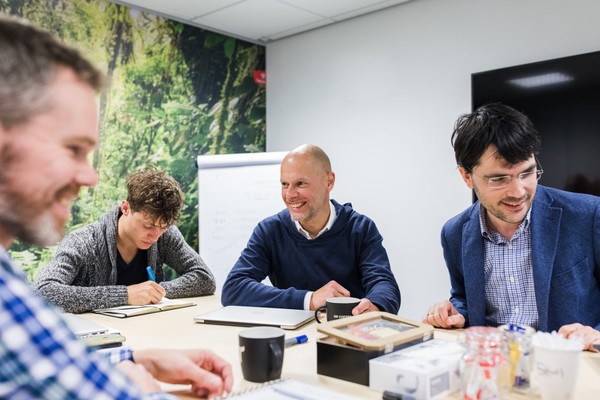cases >> FETCH
IMPROVED DETECTION OF TUMOR CELLS.

IMPROVED DETECTION OF TUMOR CELLS.
Cancer is a common disease that still claims many lives. There are many treatments for it, but choosing the right one sometimes remains a process of trial and error. Michiel Stevens, a researcher at the University of Twente, has found something to fix this. With his spin-off FETCH, he wants to offer doctors a tool that provides more insight into how the patient is doing so they can draw up a better treatment plan.
Today's technology can detect tumor cells in blood. But in practice, that is easier said than done. “Once we have the tumor cell, we can isolate and analyze it. So that was not the problem,” Michiel explains. “The problem was finding these cells. If a biopsy is not an option, the alternative is to take a blood sample. You then add iron particles with antibodies that attach to the tumor cells. You may not find any tumor cells then. That doesn't mean they aren't there. So, you need a lot of blood to find the tumor cells. With diagnostic leukapheresis, we pass 2.5 to 5 liters of blood through a machine that filters out some white blood cells - a process similar to plasma donation. Because the tumor cells are also included, it is possible to analyze more blood. However, the method that was standardly used for tubes of blood turned out to be less suitable for this material and these larger quantities. In my experience, there was much room for improvement.”
Results in practice
Achieving that improvement is what Michiel then focused on for four years and obtained his Ph.D. “I don't want it to remain in the drawer as just a book,” says Michiel. “With samples from Erasmus MC, we have shown here in the lab that with our technology, we can also find and isolate larger quantities of tumor cells in larger quantities of blood. We can better measure what is happening in the body and which treatments are appropriate. Before doctors can use it themselves in the hospital, the technology must be further developed. I want to put the improvements we have made into practice. That is why we applied for a patent and ultimately founded the spin-off.”
Entering the market
To ensure that FETCH is ultimately applied in hospitals, Michiel has mapped out a path into which markets he wants to enter. “We have started in the research market to show together with researchers that it works. We then want to focus on the pharmaceutical market. It is very interesting for them to test medicines, especially if they are aimed at a specific protein. Then, when we have further developed the technology and gathered sufficient evidence in the other two markets, we can focus on diagnostics.”
More effective treatments
Michiel knows FETCH’s potential impact on cancer patients and their doctors. “Our technology allows doctors to estimate better how quickly a tumor spreads through the body. In other words, they can better see how the cells spread through the body. This means that doctors can draw up a more appropriate treatment plan for patients, resulting in patients experiencing a higher quality of life. This health gain also means economic gain, as therapies are expensive, and it is not always clear whether the therapy will work. Treatments, therefore, become more effective. And that is necessary. Medical care must set priorities, so the better the insights, the more effective the treatments are.

"Medical care must set priorities, so the better the insights, the more effective the treatments are."
Michiel Stevens
CEO FETCHMore about
FETCH
Spin-off FETCH wants to offer doctors a tool that provides more insight into how cancer patients are doing by detecting tumor cells. This allows doctors to draw up a better treatment plan.






